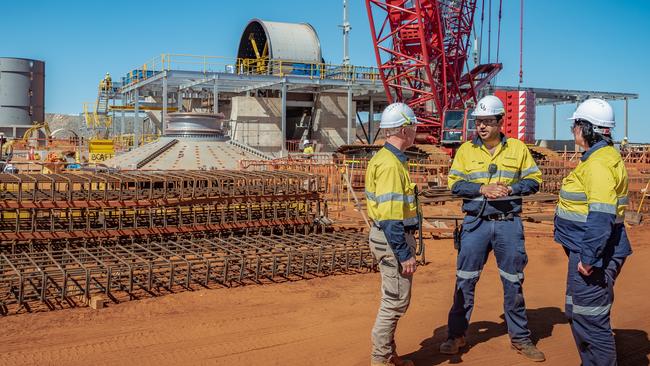
Liontown Resources boss Tony Ottaviano has hit out at short sellers targeting his stock with a view it will raise equity, suggesting they were perpetuating the narrative that it needs to tap the market.
The lithium developer is the fifth most shorted stock on the Australian Securities Exchange, with 11.6 per cent of its shares in the hands of short sellers.
Mr Ottaviano said a raise where Liontown’s share price was currently trading would be “very dilutive” and ruled the move out, saying the group had at least $450m of funding in the bank.
“We have sized that cash flow to see us through to ramp up and into positive cashflow,” he said at Kalgoorlie’s Diggers and Dealers conference on Tuesday.
Liontown has a $2.1bn market value with a 90c share price, but a year ago, its share price was about $2.75 amid a period of soaring lithium prices.
He said the issue of shorting, where shares are borrowed with the aim of buying them back at a lower price then pocketing the difference, was sensitive, and he understood the role short sellers played in uncovering companies that were not disclosing or mining the market.
“But at times it does feel it is being weaponised,” he said.
“The market is saying you need equity funding, so what’s the play? You short the stock to get a lower price and then you unwind.”
Mr Ottaviano said those doubtful could track Liontown through evidence it was on track through quarterly updates.
Liontown has the Kathleen Valley lithium mining project in Western Australia and last month it received $US250m in funding by way of convertible notes that convert at $1.80 per share and a 10-year offtake deal extension from South Korean giant LG Energy taking the agreement to 15 years.
When converted, LG Energy would in theory gain about 8 per cent of the group, which also counts mining billionaire Gina Rinehart as a key stakeholder with over 18 per cent after her on-market raid to scuttle a $6.6bn takeover by US giant Albemarle last year.
The two partners will also explore the feasibility of establishing a lithium refinery.
Kathleen Valley’s first ore was mined in the first week of August, and it is targeting 3 million tonnes per annum.
“Our view is that South Korea sees itself as the solution path for IRA (Inflation Reduction Act) compliant material for the western world, so therefore, they know they have the basic ingredients,” he said.
The IRA in the US provides tax credits for investment in clean energy.
“LG wants to be vertically integrated so we can offer them that benefit, and we want to have long-term insight into where battery chemistry is going, so it is a yin and a yang.”
Mr Ottaviano said he was sceptical whether there will be a premium for green lithium, which was why Liontown did not use the label.
“Whether the IRA and subsidies manifest into anything material is a bit by the way.”
He said the government had a role to play in ensuring that the Australian lithium industry got established.
“When you see the price drop as fast as it has, it tells you that the market is not mature, and the government has got to play a role to help buffer that until the industry sorts itself out.”
For the six months to December, Liontown posted a $31.3m loss, following a $6.9m loss in the previous corresponding period on the back of higher labour costs.
Liontown announced earlier this year that it had secured a $550m loan from a syndicate of lenders.
It agreed to a $760m package with a consortium of banks and government lenders in October, but the offer was withdrawn in January on the back of lower lithium price forecasts.




